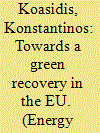|
|
|
Sort Order |
|
|
|
Items / Page
|
|
|
|
|
|
|
| Srl | Item |
| 1 |
ID:
183107


|
|
|
|
|
| Summary/Abstract |
Energy efficiency from behavioural changes will play a key role in meeting future climate targets. Current energy management actions, however, are still dominated by conventional interventions. Furthermore, demand-side transformations based on behavioural actions are hitherto underrepresented in modelling scenarios informing climate policy. In this context, this study aims to explore whether monetisation of behavioural change should be considered as a policy measure to support energy management in the residential sector. To address this question, ATOM, an energy efficiency reward mechanism based on a digital energy currency, is linked with the Dynamic high-Resolution dEmand-sidE Management model, a bottom-up agent-based model designed to simulate buildings’ energy consumption. A case study in the Greek residential sector, implementing an energy management action associated with manual adjustments of a thermostat, showcases potential for achieving a nation-wide and household-level energy reduction of 5.3% and 10% respectively, with monetisation providing an additional €200 to each engaged household on average. We highlight that monetisation of behavioural change should be considered as a promising policy, since the reward provides an adequate incentive for end-users to actively reduce consumption, and its implementation enables the quantification of behavioural change in monetary units, rendering social aspects easier to integrate in models.
|
|
|
|
|
|
|
|
|
|
|
|
|
|
|
|
| 2 |
ID:
187612


|
|
|
|
|
| Summary/Abstract |
To tackle the negative socioeconomic implications of the COVID-19 pandemic, the European Union (EU) introduced the Recovery and Resilience Facility, a financial instrument to help Member States recover, on the basis that minimum 37% of the recovery funds flow towards the green transition. This study contributes to the emerging modelling literature on assessing COVID-19 vis-à-vis decarbonisation efforts, with a particular focus on employment, by optimally allocating the green part of the EU recovery stimulus in selected low-carbon technologies and quantifying the trade-offs between resulting emissions reductions and employment gains in the energy sector. We couple an integrated assessment model with a multi-objective linear-programming model and an uncertainty analysis framework aiming to identify robust portfolio mixes. We find that it is possible to allocate recovery packages to align mitigation goals with both short- and long-term energy-sector employment, although over-emphasising the longer-term sustainability of new energy-sector jobs may be costlier and more vulnerable to uncertainties compared to prioritising environmental and near-term employment gains. Robust portfolios with balanced performance across objectives consistently feature small shares of offshore wind and nuclear investments, while the largest chunks are dominated by onshore wind and biofuels, two technologies with opposite impacts on near- and long-term employment gains.
|
|
|
|
|
|
|
|
|
|
|
|
|
|
|
|
|
|
|
|
|